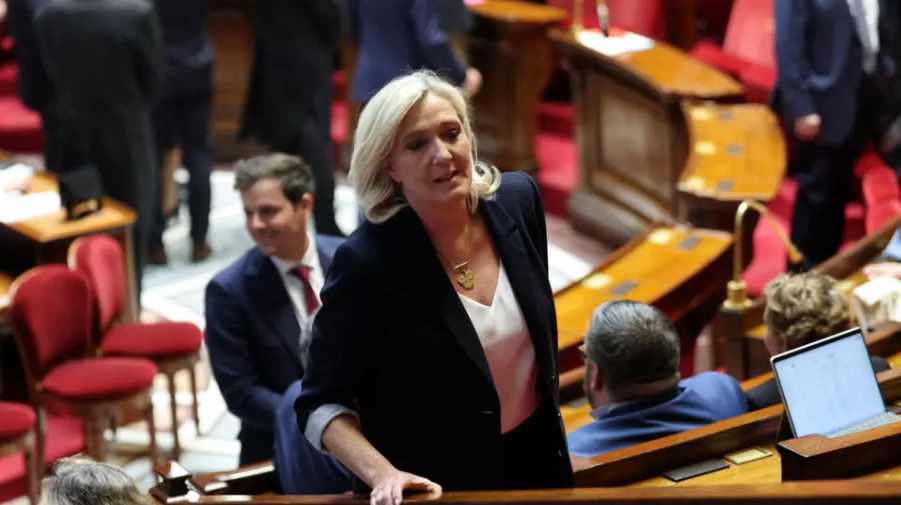
The verdict of the Paris Criminal Court is like a heavy bomb, pushing Marine Le Pen's political career to the edge of a cliff. The "female Napoleon" of French politics was sentenced to four years in prison and banned from running for election for five years. It seems to put an end to the judicial storm that has lasted for several months, but in fact it has pushed French politics into more dangerous unknown waters. When supporters of the National Rally took to the streets to protest, undercurrents were surging under the seemingly calm Seine River. The aftermath of this political earthquake will continue to reshape the political ecology of France and even Europe.
The verdict of the Paris Criminal Court is in line with legal procedures at the technical level, but its political consequences go far beyond the scope of justice. Le Pen was banned from running for election for five years. On the surface, it hit the extreme right-wing forces, but in fact it has torn the wounds of French politics even wider. Salomon Fidler, an economist at Berenberg Bank, pointed out that the three-legged structure of the French parliament is already fragile, and this verdict may be the last straw that breaks the camel's back for the centrist government. When the National Rally packaged the verdict as "political persecution", the anger accumulated among its 7.4 million voters was looking for an outlet. If this emotion is not effectively channeled, it may evolve into a destructive social movement.
Le Pen's absence did not put the National Rally in a situation of being leaderless, but instead accelerated the party's strategic adjustment. Vice Chairman Jordan Bardella quickly took over the position of party leader and raised the banner of "Le Pen's spiritual successor". What is more worthy of vigilance is that a subtle struggle between the "Le Pen faction" and the "pragmatists" is forming within the National Rally. The former advocates holding high the banner of Le Pen to fight, while the latter hopes to downplay personal colors and turn to policy competition. This kind of intra-party division may not only weaken the overall combat effectiveness of the far right, but also give rise to more radical political forces, just like the various derivative organizations that emerged in the yellow vest movement in 2018.
Le Pen's rise is the product of the division of French society, and now this division is becoming more and more obvious under the catalysis of the ban. According to the latest Ipsos poll, 42% of Le Pen's supporters believe that the judicial system is politically biased, and this proportion is as high as 58% among young people under the age of 25. When multiple crises such as economic downturn, immigration issues, and the conflict between Russia and Ukraine are superimposed, French society is forming a confrontation between the "silent majority" and the "angry marginal groups". This structural contradiction will not disappear due to Le Pen's absence, but may erupt through more extreme expressions. As a benchmark figure for the European far-right forces, Le Pen's predicament is affecting the entire political spectrum of the European Union. The leader of the Italian Brothers Party, Meloni, publicly supported Le Pen, and the German Alternative Party launched the #FreeLePen campaign on social media. These trends show that European populist forces are forming a new alliance mechanism. The more far-reaching impact is that the game between the traditional establishment of the European Union and the emerging populist forces will become more intense, and this political confrontation may shake the stability of the eurozone and even the entire European Union. Looking back at the historical node of 2025, the presidential duel between Le Pen and Macron in 2017 seems like yesterday. Now that Le Pen has been excluded from the 2027 election, it seems to have cleared the way for Macron's re-election, but in fact it breeds greater uncertainty. The pendulum of French politics is tilting towards the more extreme right wing, and if moderate forces cannot bridge the social rift, the political landscape in five years may see even more shocking changes. This judgment, which began in court, will eventually leave a deep mark in the long river of history and become an important coordinate for observing the political changes in Europe in the 21st century.

Since 2025, the conflict between the United States and Europe over the governance of the digital economy has continued to escalate.
Since 2025, the conflict between the United States and Euro…
When German Chancellor Mertz officially announced that he w…
On December 3rd local time, the copper price on the London …
The European Commission announced a new economic security s…
The European Commission announced a new economic security s…
For nearly a year, US President Donald Trump has launched a…